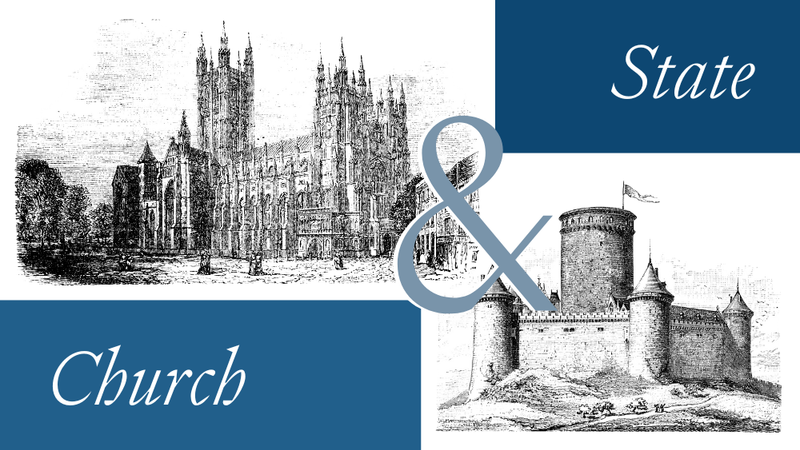The relationship between church and state has generated questions from the start. Although the basic biblical principles seem straightforward, their applications to specific situations have frequently been muddled and perplexing. At the root of this confusion might be what Leonardo de Chirico, historian and chair of the Theological Commission of the Italian Evangelical Alliance, calls the church’s “original sin; that is, its desire to be both church and state.”
Roman Emperor Constantine has often been blamed for first muddling these waters. Before him, the apologists left us the picture of a persecuted church striving to respond to mistreatments with forgiveness and patience, setting an example of communal love and respect for authorities in everything that is not sinful.
A primary, much-quoted example of early Christians’ relationship to the state is the Letter to Diognetus, portraying Christians as people who “dwell in the world, yet are not of the world”—people who are “distinguished from other men neither by country, nor language, nor the customs which they observe. . . . But, inhabiting Greek as well as barbarian cities . . . following the customs of the natives in respect to clothing, food, and the rest of their ordinary conduct, they display to us their wonderful and confessedly striking method of life” (which the letter goes on to describe). Although the reality may not always have been as idyllic as Diognetus’s description, he conveyed the general ideal and mindset.
Enter Constantine with the 313 Edict of Milan, making Christianity an accepted religion in the Roman Empire. (Even Galerius, one of the fiercest enemies of Christianity, eventually came to realize that persecuting Christians was a counter productive battle.) But the fact that Constantine endorsed Christianity caused a proliferation of nominal Christians seeking imperial favor—and, consequently, a rise of ascetics looking for a more committed expression of Christian life.
Yet, as pivotal as Constantine’s edict was, much stayed the same. Each emperor still felt bound to his traditional duties of pontifex maximus, supervising the religious life of his people (as is clear in Constantine’s convocation and supervision of the Council of Nicaea in 325). Besides, the Edict of Milan and the Council of Nicaea did not put an end to religious disputes and persecution. Constantine’s sons embraced Arian views and harassed, threatened, and exiled bishops who refused to submit to their religious dictates.
In 380, Emperor Theodosius made Nicene Christianity the state religion, although Arianism persisted throughout the empire. The church then continued to become more prosperous and institutionalized, mimicking the structure of the empire and taking over many civil responsibilities, especially after the Western empire fell and lacked civil leaders.
A History of Problems and Compromises
The long history of conflicts between church and state during the Middle Ages is well documented. The church’s desire to be both church and state escalated to the point that several popes, such as Gelasius II and Boniface VIII, could unashamedly claim spiritual power (with political ramifications) over the whole world. This was not a simple hunger for power. Most popes were sincerely convinced they had been placed on the papal throne by God to fight his righteous battles.
And yet despite this conviction, the medieval church had to recognize the authority of secular rulers, which took different forms: from the missionary tactic of winning the approval of kings who could impose Christianity on their subjects to the foundation of a Holy Roman Empire where the pope could influence secular decisions. Even the Protestant Reformers had to accept the fact that a country’s rulers had to be on board if the church was to be reformed within its borders.
For missionaries, this inevitable alliance generated several nominally Christian states. It was, from their point of view, a victory—a foot in the door that allowed them to freely evangelize the nations. In reality, since their evangelization programs were still limited, most of the rural population lived with a mixture of paganism and Christianity—the latter scarcely taught by unprepared preachers.
A blatant example of the dangers of a close alliance between church and state is the twelfth-century story of Thomas Becket. He died by order of the same king who had ordained him archbishop of Canterbury, despite the expectation that the king would follow his lead.
For sixteenth-century Reformers, reform efforts were hardly under foot before it became clear that allying with rulers entailed some dangerous compromises. Many of the Reformers became entangled in uncomfortable politics as a result. Even those who acclaimed Elizabeth’s rise to the throne after years of Marian persecution were stumped by her 1558 act of suspension of preaching.
While the church in Britain continued to wrestle with questions of the interaction between church and state, the authors of the 1561 Belgic Confession apparently had no qualms in identifying the state as responsible “not only to have regard unto and watch for the welfare of the [civil] polity, but also to maintain the true sacred ministry; and thus may remove and prevent all idolatry and false worship; that the kingdom of anti-Christ may be thus destroyed and the kingdom of Christ promoted” (Article 36). This article was revised in 1905 by the synod of the Gereformeerde Kerken Nederlands and later denounced as unbiblical by other synods.
The Appalling Dangers of a Comfortable Blindness
The church’s desire to form an alliance with the state has dangerous ramifications. For example, an alliance with rulers who seem to endorse a Christian agenda can blind the church to dangerous compromises required by the state or to a government’s tendency to use the cross as a symbol of political power. Some extreme examples of this loss of sight are the national church of Germany during Hitler’s rule and the national church of South Africa during apartheid. The alliance between the church in Rwanda with the genocidal government of the 1990s was equally horrific. When church buildings became primary killing grounds, Christians, including pastors, joined in the killing. As Timothy Longman, director of the African Studies Center at Boston University, writes, “Christians could kill without obvious qualms of conscience, even in the church, because Christianity, as they had always known it, had been a religion defined by struggles for power, and ethnicity had always been at the base of those struggles.”
It is easy to say that our churches will never fall so low. It is therefore more difficult, but extremely important, to stop and reflect on how so many Christians all over the world have been able to still their consciences and twist the Scriptures to ally with political powers that offer a kernel of truth to justify their atrocities. Most of them were sincere Christians.
How could the churches in these countries justify, and even join, such horrific violence? According to Longman, unlike other groups and organizations of that time, the churches in Rwanda had been allowed to retain autonomy from the state. Still, “church leaders in Rwanda sought to maintain a close and cooperative relationship with political leaders, believing that an alliance with the state created the optimum setting for a church to flourish.” It is sobering to realize how easily seemingly innocuous pragmatism can degenerate into all-too-comfortable blinders.
Conversely, a church can compromise with the government out of fear. If there is a perception that an alliance with the state can help a church to flourish, there is an equally pervasive fear that if a church does not ally with a government that promises protection (or at least the preservation of a comfortable status quo), the church will be destroyed. In this scenario, Christians have often compromised their principles—even their basic theology. Looking back at the crimes of apartheid, Anglican bishop Frank Retief confessed,
Like most other whites, our white-led church believed we were in a struggle for Western values and freedoms and that the liberation groups were all pawns of the communist regimes. Be that as it may, the fact of the matter is that we allowed ourselves to be misled into accepting a social, economic, and political system that was cruel and oppressive.
Likewise, fear induced many Christians in China to ally with a government that requires unquestioning loyalty not only to itself but to the theology it sponsors—a theology that rewrites Christianity to prioritize political unity. According to Wang Yi, a Chinese pastor imprisoned for his beliefs,
After the government issued three threats, other church leaders felt that a storm was coming. They lost hope in the word in which they believed and in the sovereignty of God in history. They came to believe that if they did not compromise, the church would be thoroughly ruined. Because of their small faith, thinking that they were suffering for Christ, they accepted codependence on politics.
A Courageous Resistance
It is, however, encouraging to remember that even in these dire situations, many Christians have resisted, often at personal loss, these common temptations of compromising with the state, putting their trust in a political power, or setting themselves as a rival power. If the desire to be church and state is the original sin, these Christians have manifested the proper attitude of a redeemed church, keeping to the mission Jesus gave them when he said,
“All authority in heaven and on earth has been given to me. Go therefore and make disciples of all nations, baptizing them in the name of the Father and of the Son and of the Holy Spirit, teaching them to observe all that I have commanded you. And behold, I am with you always, to the end of the age.” (Matt. 28:18–20)
As Wang Yi observed,
An organization cannot be called a church if it does not make the Great Commission its primary objective. . . . If a church sacrifices its root to express love to the motherland, this love is worthless because the existence of the church is worthless, like salt that has lost its taste. . . . Only when churches stand firm in the foundation of the universal church through dependence on Christ will they be able to express their respect for secular power and their love for their neighbors. This is the proper starting point for patriotism.
In its inevitable interactions with the state, which might include resistance when necessary, Wang believes it is important for the church to check its motives: “How do we show that we are motivated by faith, not by political goals? We must be willing to take the way of the cross and suffer for our faith.”
In this, he echoes the writings of the early church and the firm consciousness of Christian identity that prompted martyrs like Perpetua to say, “I cannot call myself by any other name than what I am, a Christian.” It is this consciousness of who we are in Christ that will prevent us from falling back into the church’s “original sin” in all its modern, often subtle expressions. And it is this consciousness that will remind us that, as we keep to our task, Christ will keep his promise of building his church against the gates of hell (Matt. 16:18), since he has already “overcome the world” (John 16:33).
Footnotes
Leonardo de Chirico, Letture Patristiche (IV–V secolo), Year XXXI 2019/1N. 61, IFED.
Back“The Epistle of Mathetes to Diognetus,” Ante-Nicene Fathers, vol. 1, chapters 6, 5, ed. Alexander Roberts, James Donaldson, and A. Cleveland Coxe, trans. Alexander Roberts and James Donaldson (Buffalo, NY: Christian Literature, 1885). Rev. and ed. Kevin Knight, New Advent, http://www.newadvent.org/fathers/0101.htm.
BackTimothy Longman, Christianity and Genocide in Rwanda (Cambridge: Cambridge University Press, 2011), 164.
BackLongman, Christianity and Genocide in Rwanda, 26.
BackFrank Retief, answering a panel chaired by TRC head Archbishop Desmond Tutu, South African Press Association, November 1997, https://www.justice.gov.za/trc/media/1997/9711/s971117h.htm.
BackWang Yi et al., Faithful Disobedience: Writings on Church and State from a Chinese House Church Movement, ed. Hannah Nation and J. D. Tseng (Downers Grove, IL: IVP Academic, 2022), 70.
BackYi et al., Faithful Disobedience, 60.
BackYi et al., Faithful Disobedience, 195.
Back








